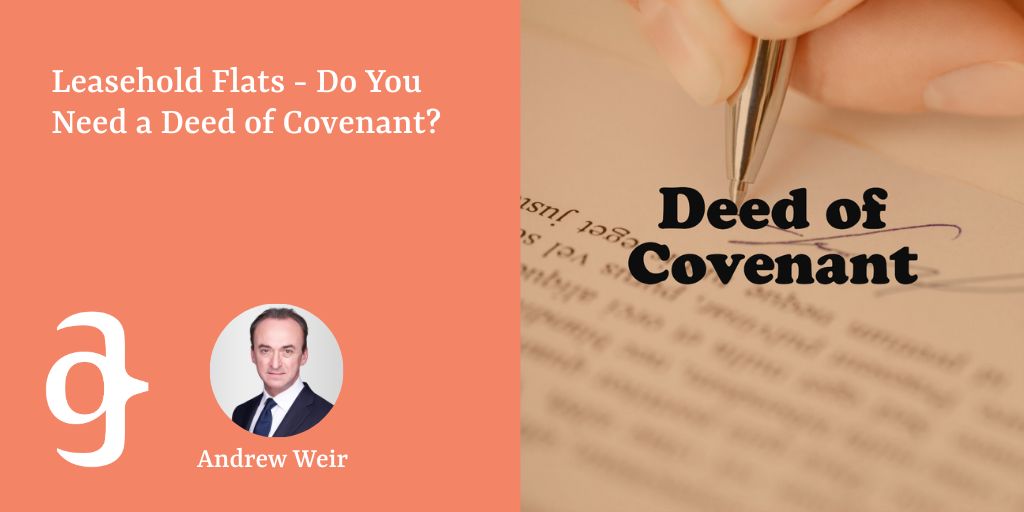Leasehold Flats – Do You Need a Deed of Covenant?

Navigating the world of real estate and property law can be complex, especially when it comes to understanding key terms like “covenants” and “deed of covenant”. In our comprehensive guide, we will delve deep into covenants, exploring their types, their role in leasehold titles, and the necessity of a deed of covenant.
What is a covenant?
In simple terms, a covenant is a legal promise that you will carry out certain acts or refrain from doing certain things.
How many types of covenants are there?
There are two types of covenants:
Positive covenants
Positive covenants are acts that you must carry out such as paying service charges, repainting every five years, keeping the property in good repair, and so on.
Negative Covenants
Negative covenants however stop you from doing certain acts with the property such as not allowing you to carry out illegal acts or cause a nuisance, or not allowing you to sublet the property.
So it is important that you read the covenants in the lease carefully so that you understand what restrictions apply when you agree to buy a leasehold property.
What is the deed of covenant for?
With Freehold titles, positive covenants do not pass with the land and so are not enforceable upon any new owner of the property.
However, with leasehold titles positive obligations are automatically binding upon successors in title to both landlords and tenants.
When buying a leasehold property, the deed of covenant acts to confer rights between the parties or protect what is known as ‘Privity of Contract’. This principle provides that a contract cannot confer rights or impose obligations upon any person who is not a party to the contract.
The deed of covenant is therefore used to create a direct contract between the landlord/managing agents and the new leaseholder.
This way, the landlord/managing agents are able to go directly to the new leaseholder to collect ground rent and service charge payments, as well as being able to enforce the covenants on the new leaseholder directly.
Why is the deed of covenant needed?
Aside from the main reason mentioned above, the majority of leases today state that a deed of covenant is required upon any transfer, assignment or underletting of the property.
Since this deed forms one of the obligations in the lease, failure to enter into such a deed amounts to a breach of the lease.
In many cases, it also means that the managing agents/landlord will not accept any of your payments for service charges or ground rent until the deed is submitted since if they accepted the money when there has been a breach, this could waive the landlords’ right in future to enforce the covenants in the lease.
If this happens, even though a leaseholder is sending your service charge and ground rent payments as required, since the management agents/landlord will not accept this money due to a breach of the lease, you can end up getting into arrears with your payments which could lead to more substantial penalties and interest.
But is a deed of covenant still needed?
There has been much debate in the legal world as to whether deeds of covenant still have any useful application in modern-day law.
Under the Landlord & Tenant (Covenants) Act 1995, Section 12 essentially states that on any assignment of the Lease, the benefit and burden of covenants made by the tenant with the third party pass to the tenant’s assignee – so privity of contract is still maintained between the new leaseholder and the landlord/management company and so a deed of covenant will most likely be superfluous to the entire process.
There is also Section 78(1) of the Law of Property Act 1925 which states that in respect of all covenants entered into after the Act came into effect, it is implied that the covenants are to run with the land unless the covenant itself EXPRESSLY states that the covenant is EXCLUSIVELY for the current landlord/management company and the current leaseholder.
Conclusion – Deed of Covenant
Where your lease states that a deed of covenant is required, you need to sign this in order to comply with all of the obligations set out within the Lease you are now taking over.
While legally speaking providing for such a deed may be unnecessary, it has become common practice for leases to require this and the practical implications of not supplying this deed could cause you to be in breach of your lease.
If you are currently looking at buying a leasehold property, you are more than welcome to contact us here at Anthony Gold and one of our experienced conveyancing solicitors will be able to advise you on the process and implications of the property in question.
* Disclaimer: The information on the Anthony Gold website is for general information only and reflects the position at the date of publication. It does not constitute legal advice and should not be treated as such. It is provided without any representations or warranties, express or implied.*
I am current currently in a complaint position with the leaseholder/Management company for my daughters Lea should in Weymouth
There are differences in the annual reconcile between the main lease contract and the Deed of covenant I.e the main lease (landlord) states that in the event that an underspend of the SC gains the estimate is returned to the payee the attached Management Company states it goes to the MC sinking fund. Can I request a review / advise of the documents
You are welcome to contact us.
Love this information about property law absolutely Brilliant
great article